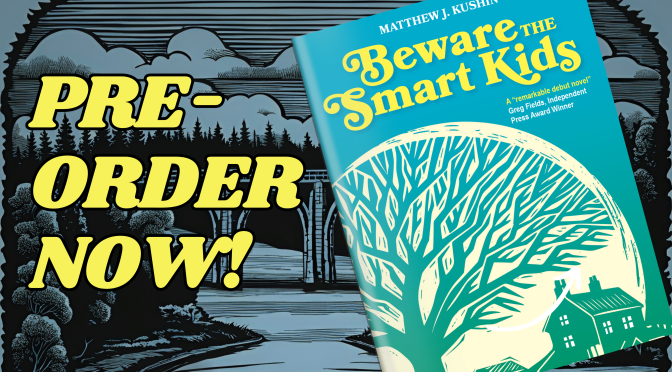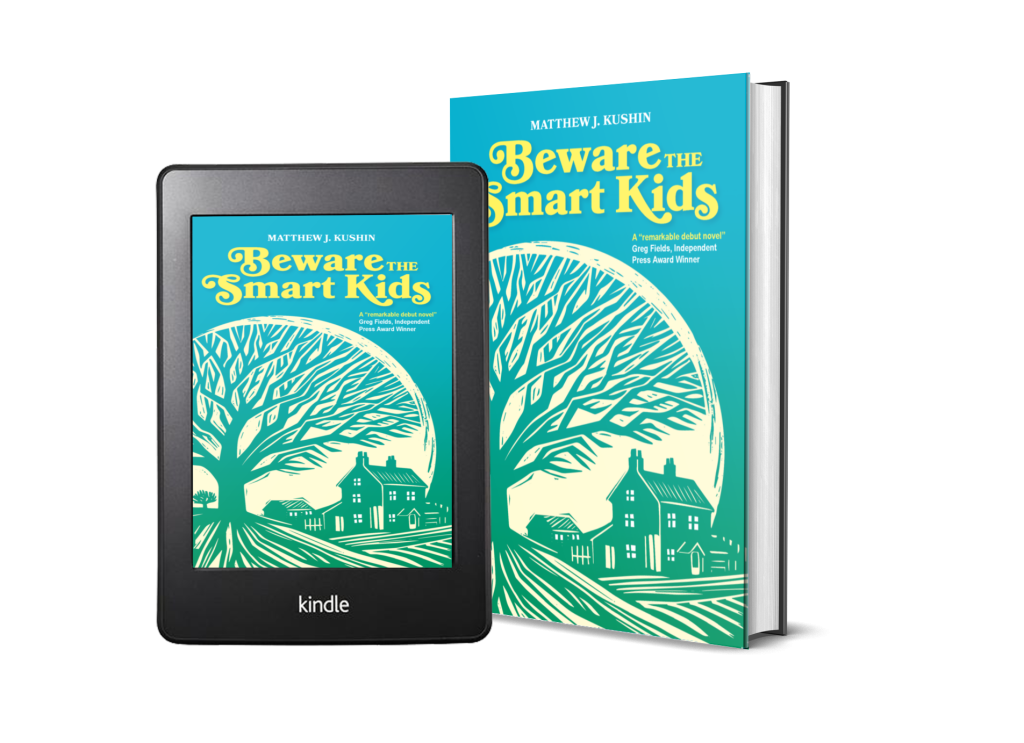This post may contain affiliate links. Please read my disclosure for details.
Table of Contents
Beware The Smart Kids, Coming-of-Age Novel About Finding Happiness is Now Available
I’m thrilled to announce that Beware the Smart Kids, my coming-of-age novel about a troubled teenager, an ex-convict, and the search for happiness is now available to order on Amazon, BookShop.org, and Barnes & Noble (among others).
In this post, I’ll tell you why I wrote this book. Then, I’ll share resources that families, teachers, and bookclubs can use to start conversations about happiness. Third, I’ll tell you about the book by sharing the book blurb. Lastly, I’ll provide a few additional resources.
Why I Wrote a Novel about Happiness (and the Hard Journey in Search of It)
As long-time readers know, I went on sabbatical in Fall 2023. The purpose of that sabbatical was to write this book.
I taught a class on happiness and media use in Spring 2023 because I felt I needed it and so did our students (here’s why in detail). The class was a big hit. I found myself wondering how I could get some of the core takeaways from the class to a wider audience.
If I had to bet, I imagine you would not expect that I applied for a sabbatical so that I could write a novel. It likely seems much more in character for me to propose that I create some kind of social media content, such as a podcast, YouTube channel, or even a TikTok profile filled with content about happiness and the media.
In fact, before I started creating the class Happiness: Media v. Reality, I would have been right there with you. But through my work developing that course, I learned a great deal about the relationship between media use and subjective wellbeing (i.e., happiness). I came to appreciate some the potential negative impacts media may have on young people. I also learned to appreciate the possible positive impacts media can have.
The research on the relationship between well-being and social media (or heavy phone use more broadly) is complex and contradictory in areas. For example, Jonathan Haidt put forth his argument in his recently-published, popular book The Anxious Generation. Others have questioned Haidt’s conclusions, including University of California, Irvine, psychology professor Candice Odgers. (Note that I’m not an expert on media use and well-being. I just find it fascinating. My class looked at research conducted by other people; not me).
We know that the media can have positive effects, too.
Kindness media is media that contains portrayals of people helping or supporting each other (Fryburg et al., 2021). Emerging research suggests that this type of media can have positive impacts on consumers. For example, research suggests that consumption of meaningful films which contain themes of connectedness, love and kindness (such as is found in drama, sad and historical genres) is associated with increases in elevation (Fryburg et al., 2021; Janicke & Oliver, 2015). Elevation is a sense of warmth we feel when witnessing others engage in virtuous acts and it enhances feelings of shared human goodness, connectedness, and favorable attitudes towards others (Fryburg et al., 2021). Elevation relates to the concept of eudaimonic happiness, a holistic view of one’s life satisfaction that is long-term, aligns with one’s virtues and morals, and is representative of having a satisfying life. Media may satisfy eudaimonic happiness by allowing individuals to share emotions, engage without risk with other humans through characters, vicariously experience our emotional vulnerabilities, and contemplate ourselves and our lives (Bartsch, 2012).
Exposure to kindness boosts self-esteem and increases social self-efficacy (Datu et al., 2021). But it also can bolster media literacy skills, particularly critical prosumption – or the creation of media that “reflect one’s personal insights and anticipat[es] the possible consequences of newly created media content on others’ lives” (Datu et al., 2021, p. 2). This means that exposure to kindness may enhance a user’s preference for content (such as on social media) that is ethically minded. In short, kindness begets kindness.
I’m fortunate to work at a liberal arts university that highly values the power of narrative to influence how we see make sense of the world and our place within it.
With that in mind, I set out to write a novel that, hopefully, leverages the potential benefits of from kindness media to bolster eudaimonic happiness in readers. My hope is that consumption of this novel will encourage further acts of, and conversations about, kindness.
Ultimately, I wrote a story about a troubled teenager who learns what I call ‘the Atlas to a Kinder Universe’ (or, five important lessons about happiness).
But please know that Beware the Smart Kids is not simply a ‘feel good’ story. It deals with real issues that teens and adults face. If it were a movie, I imagine it would be rated PG-13. The story is a bit Tuesdays with Morie, and a bit “Goodwill Hunting.”
Beware the Smart Kids Resources
With the help of some friends, I’ve put together book resources to help foster conversations:
- Beware the Smart Kids book discussion questions
- Beware the Smart Kids teaching resources and activities
- Suggested Readings & a deep dive into the Atlas to a Kinder Universe
Beware the Smart Kids Synopsis
Okay, okay. Now to the fun stuff. Here’s the text from the back of Beware the Smart Kids:
Lost. Miserable. Lonely. Desperate for something more. That’s life for teenager Nolan Sussman until an ex-convict who knows the 5 secrets to happiness returns to town.
“Beware the Smart Kids is a story for teenagers…those who feel invisible, those who are hiding their pain, those who think they’ll never find the answers, those who are yearning for something but don’t know what. And it’s a story for ‘former teenagers’ who are now trying to raise and love a teenager, but who have likely forgotten the hard parts of being one.”
– Margaret Standafer, best-selling and award-winning author of the coming-of-age novel, I Know an Old Lady.
Misfit troublemaker Nolan Sussman badly wants two things before high school ends: the attention of Gabi Meyers and the return of his runaway sister, Sarah.
But when his latest prank goes awry, Nolan is nearly expelled. He’s forced to spend his summer doing yard work for Mr. Barno, a reclusive former high school teacher who spent 25 years in prison.
Nolan soon finds that despite the tragic mistake that landed Mr. Barno in prison, the old man has something even more elusive than Gabi and Sarah—happiness.
Now, Nolan is determined to learn how to be happy, too. It’s his chance to matter. His shot at a future. But secrets in Mr. Barno’s past are preventing the once-beloved educator from having the will to ever teach again. Secrets the two outcasts will have to face together.
Again, I hope you enjoy Beware the Smart Kids. Grab a copy now. I hope it helps start some conversations in your world.
If you do read it, I would love it if you reviewed it on Amazon, social media, and/or Goodreads.
Fun, Bonus materials for Beware the Smart Kids
- Beware the Smart Kids song playlist on Spotify or Amazon Music—hear every song mentioned in the book (parents: this list includes a few songs with explicit lyrics).
- The Atlas to a Kinder Universe Podcast on Spotify
Referenced Ciations
Bartsch, A. (2012). Emotional gratification in entertainment experience. Why viewers of movies and television series find it rewarding to experience emotions. Media Psychology, 15(3), 267-302.
Datu, J. A. D., Wong, G. S. P., & Rubie-Davies, C. (2021). Can kindness promote media literacy skills, self-esteem, and social self-efficacy among selected female secondary school students? An intervention study. Computers & Education, 161, 104062.
Fryburg, D. A., Ureles, S. D., Myrick, J. G., Carpentier, F. D., & Oliver, M. B. (2021). Kindness Media rapidly inspires viewers and increases happiness, calm, gratitude, and generosity in a healthcare setting. Frontiers in psychology, 11, 3938.
Janicke, S. & Oliver, M.B. (2015). The relationship between elevation, connectedness, and compassionate love in meaningful films. Chapman University Digital Commons.

